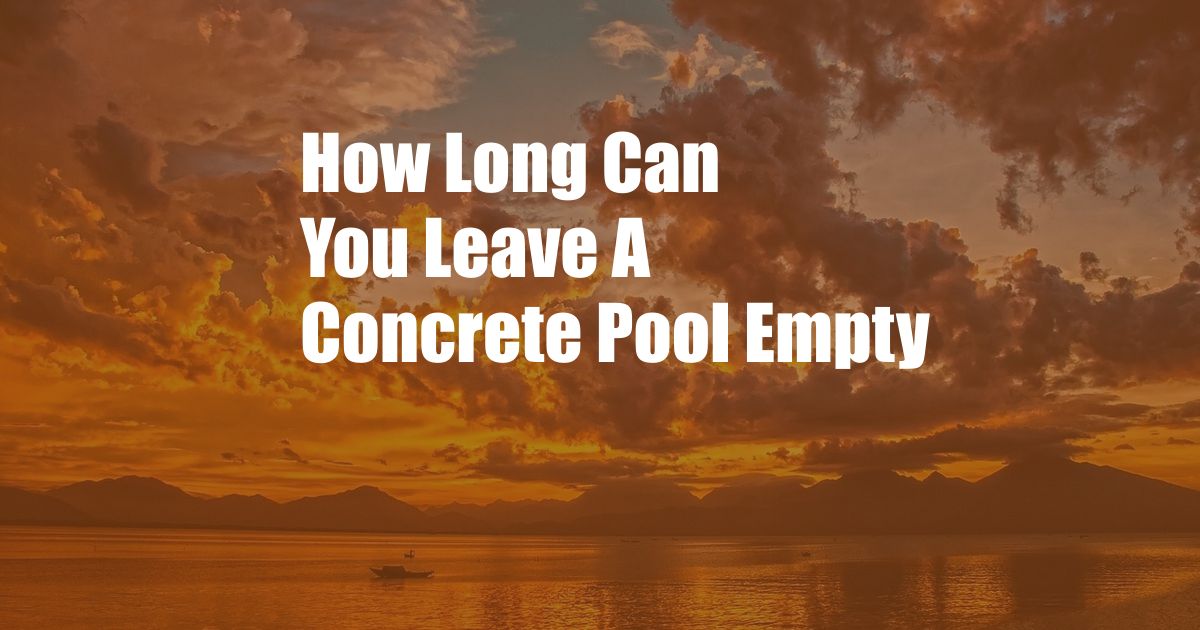
How Long Can You Leave a Concrete Pool Empty?
As a homeowner with a concrete pool, understanding the consequences of leaving it empty for an extended period is crucial for its longevity and overall well-being. In this comprehensive article, we’ll delve into the intricate details surrounding this topic, providing you with expert advice.
Before we proceed, it’s essential to highlight that leaving your pool empty for an extended period is generally not advisable unless absolutely necessary. Concrete pools are designed to hold water, and prolonged exposure to dry conditions can lead to severe structural damage, compromising the pool’s integrity and safety.
Understanding the Risks of Leaving a Concrete Pool Empty
Concrete pools are composed of reinforced concrete, a porous material that relies on water to maintain its structural stability. When the pool is filled with water, the weight of the liquid evenly distributes pressure across the pool’s surface, preventing cracks or deformations. However, when the pool is empty, the concrete is subjected to uneven drying, causing it to contract and weaken.
This uneven drying can result in the formation of cracks, which can compromise the pool’s watertightness and potentially lead to leaks. Additionally, the exposed concrete can become brittle, increasing its susceptibility to damage from external factors such as temperature fluctuations or heavy rainfall.
How Long is Too Long?
The ideal scenario is to never leave a concrete pool empty for an extended period. However, in certain circumstances, such as during renovations or unforeseen events, emptying the pool may be necessary. In such cases, it’s crucial to minimize the time the pool remains empty and take necessary precautions to mitigate potential risks.
Generally, it’s safe to leave a concrete pool empty for up to two weeks without significant concerns. However, beyond this timeframe, the risk of structural damage increases substantially. If the pool must remain empty for longer, additional measures, such as covering the pool with a tarp or installing temporary support beams, should be considered.
Tips and Expert Advice
To ensure your concrete pool remains in optimal condition, follow these expert tips:
- Avoid leaving the pool empty for extended periods whenever possible.
- If emptying the pool is necessary, keep the duration as brief as possible.
- Cover the empty pool with a tarp or plastic sheeting to protect it from the elements.
- For long-term empty periods, consider installing temporary support beams to reinforce the pool structure.
- If you notice any cracks or other signs of damage after refilling the pool, contact a qualified pool professional immediately.
By following these guidelines, you can minimize the risks associated with leaving a concrete pool empty and preserve its longevity for years to come.
FAQ on Leaving a Concrete Pool Empty
- Q: Can I leave my concrete pool empty for the winter?
A: It’s generally not advisable to leave a concrete pool empty during the winter due to the risk of freezing and thawing cycles, which can cause significant structural damage.
- Q: How can I tell if my concrete pool has been damaged due to being empty?
A: Look for signs of cracks, leaks, or unusual settling in the pool’s structure. If you notice any of these issues, contact a qualified pool professional for an inspection.
- Q: What are the benefits of covering an empty concrete pool?
A: Covering the pool protects it from UV rays, dust, debris, and other environmental factors that can deteriorate the concrete.
Conclusion
Leaving a concrete pool empty for an extended period can have detrimental effects on its structural integrity. While it’s generally safe to leave the pool empty for up to two weeks, longer durations should be avoided. By following the expert advice outlined in this article, you can safeguard your pool from damage and ensure its longevity.
Are you interested in learning more about the care and maintenance of concrete pools? Explore our comprehensive knowledge base for additional insights and expert guidance.